SRF Method, Mixing Tank CFD Simulation by ANSYS Fluent Tutorial
$100.00 $50.00 Student Discount
- The problem numerically simulates the performance of a mixing tank using ANSYS Fluent software.
- We design the 3-D model by the Design Modeler and create the mesh using ANSYS Meshing software.
- The element number equals 278,775.
- The SRF option is enabled to define the rotational motion of the impellers.
To Order Your Project or benefit from a CFD consultation, contact our experts via email (info@mr-cfd.com), online support tab, or WhatsApp at +44 7443 197273.
There are some Free Products to check our service quality.
If you want the training video in another language instead of English, ask it via info@mr-cfd.com after you buy the product.
Description
Description
The present problem simulates the performance of a mixing tank by ANSYS Fluent software.
The closed mixing tank contains water liquid while the impeller starts rotating with 500 rev/min angular velocity, creating a massive vortex in the middle of the tank.
The geometry of the present model is three-dimensional and has been designed using Design Modeler software. We do the meshing of the present model by ANSYS Meshing software. The mesh type is unstructured, and the element number is 278,775.
This product is the 2nd episode of the Turbomachinery Training Course.
Methodology: Mixing Tank CFD Simulation by SRF Method
The Single Reference Frames (SRF) method is enabled to model the rotational movement of the impeller. In this method, which should be enabled like the MRF method, there is only one domain in the solution and there are no other stationary zones. The flow in this zone rotates while the impeller is fixed.
The solution is Steady, and the k- Ꜫ model is chosen to simulate the turbulence of the flow.
Conclusion
Since the main purpose of the issue is to investigate water movement inside a mixing tank, its related contours can be shown in the figures. Two-dimensional contours related to pressure, velocity, as well as turbulent intensity were obtained.
In the case of pressure, it is visible that the amount of water pressure increases as getting close to the wall of the tank.
As was expected, the flow speed same as pressure increases, moving away from the center of the tank. Also, the turbulent intensity parameter shows us the turbulence all over the tank.
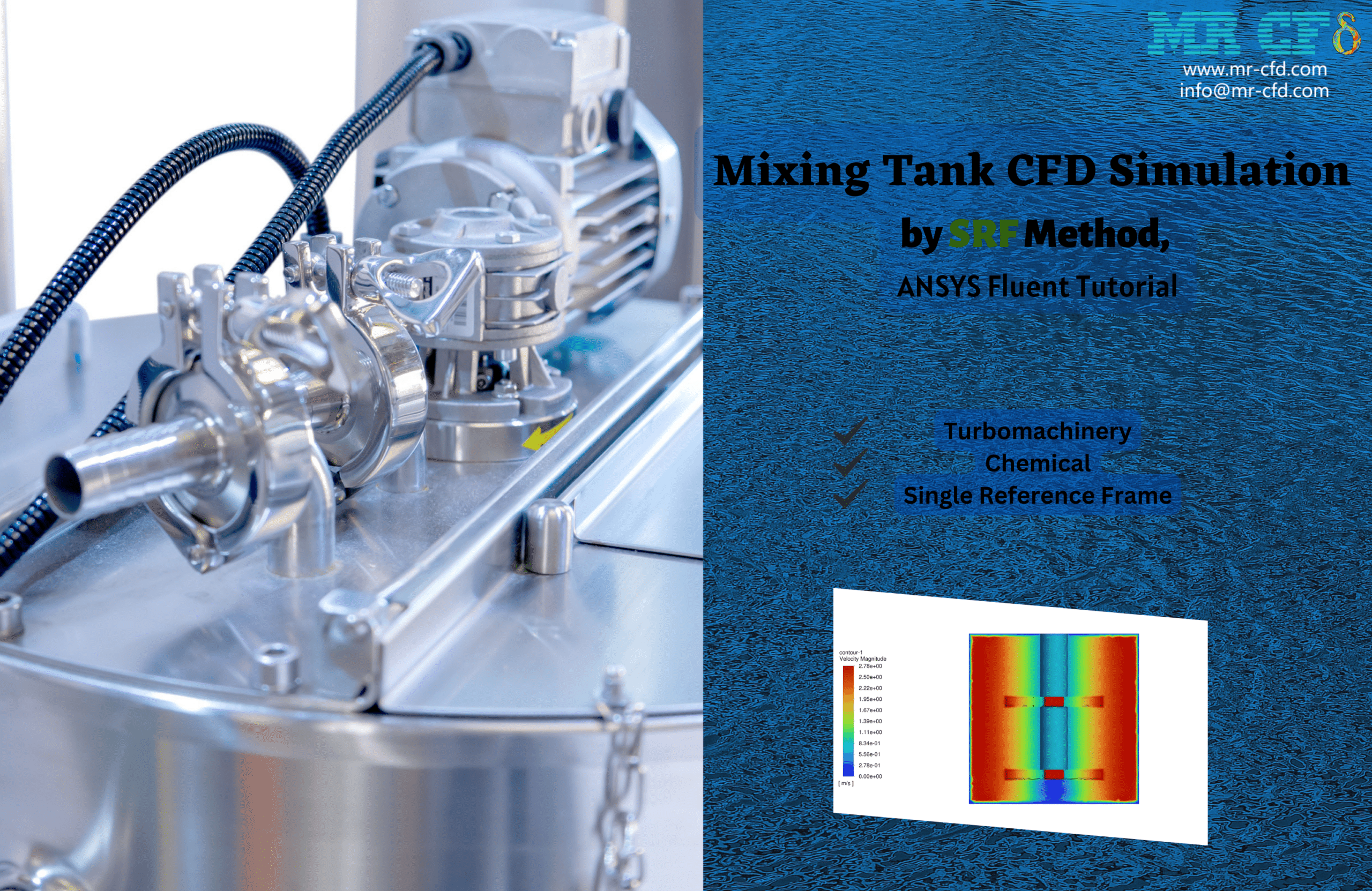
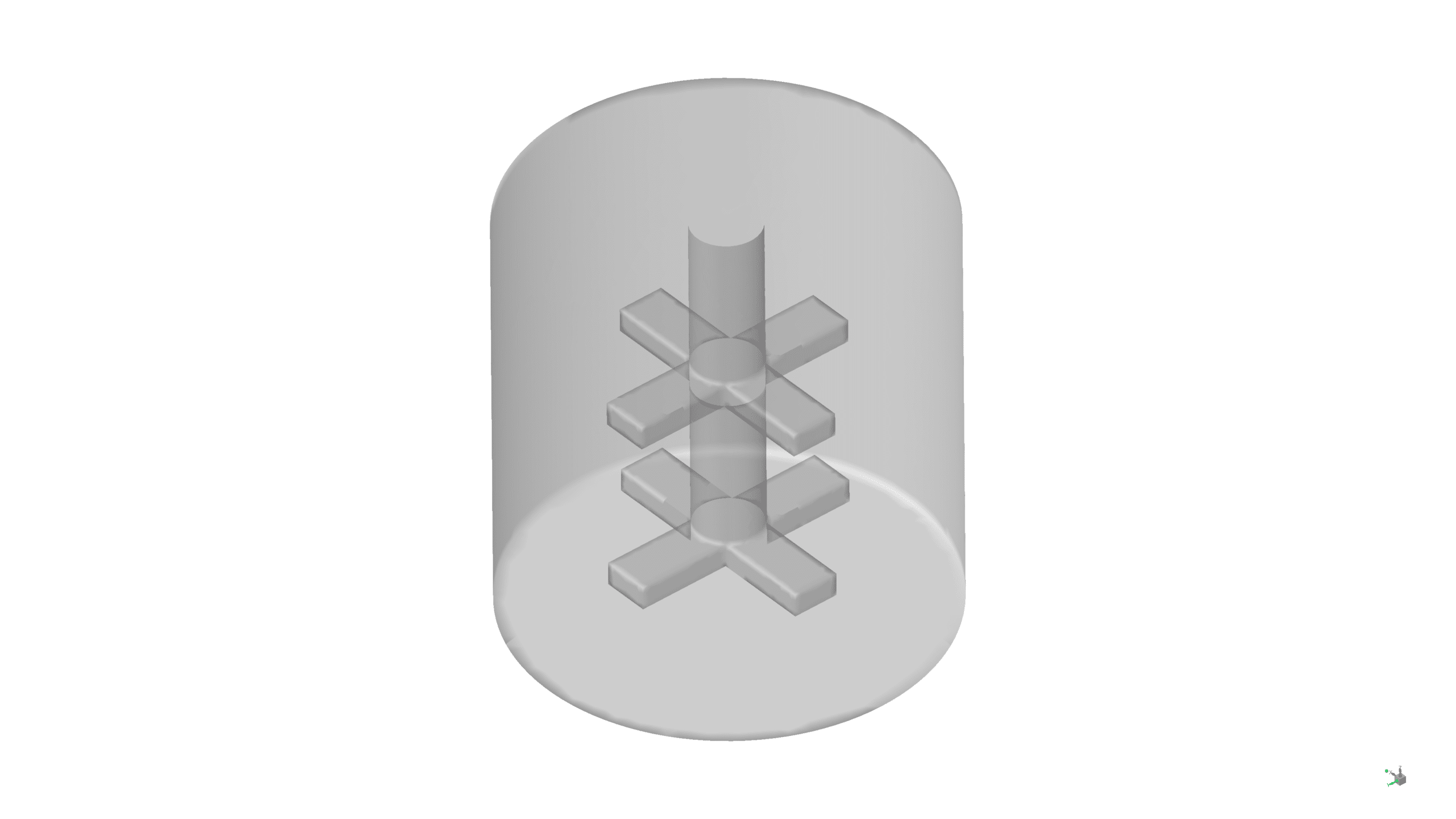
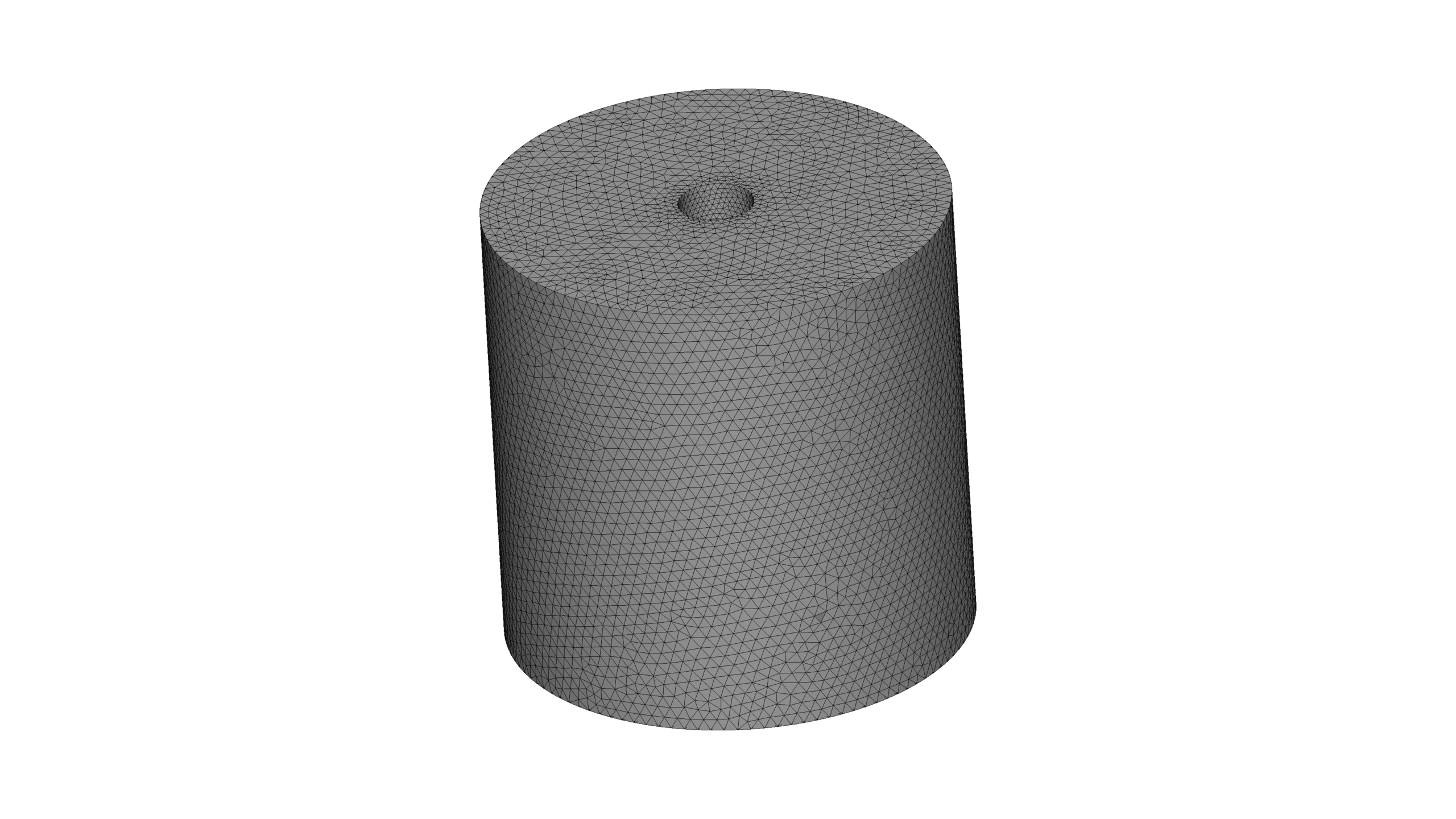

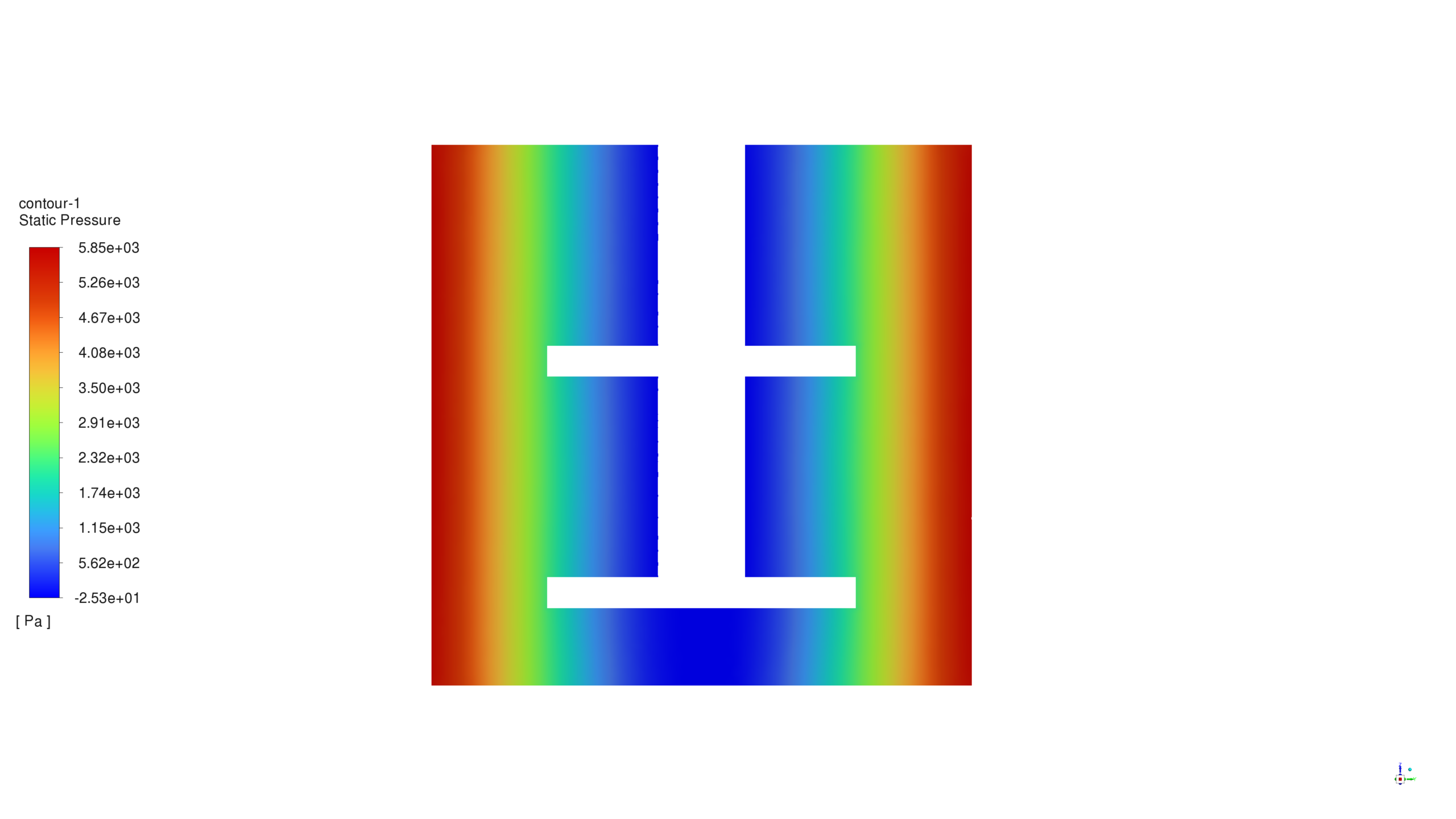
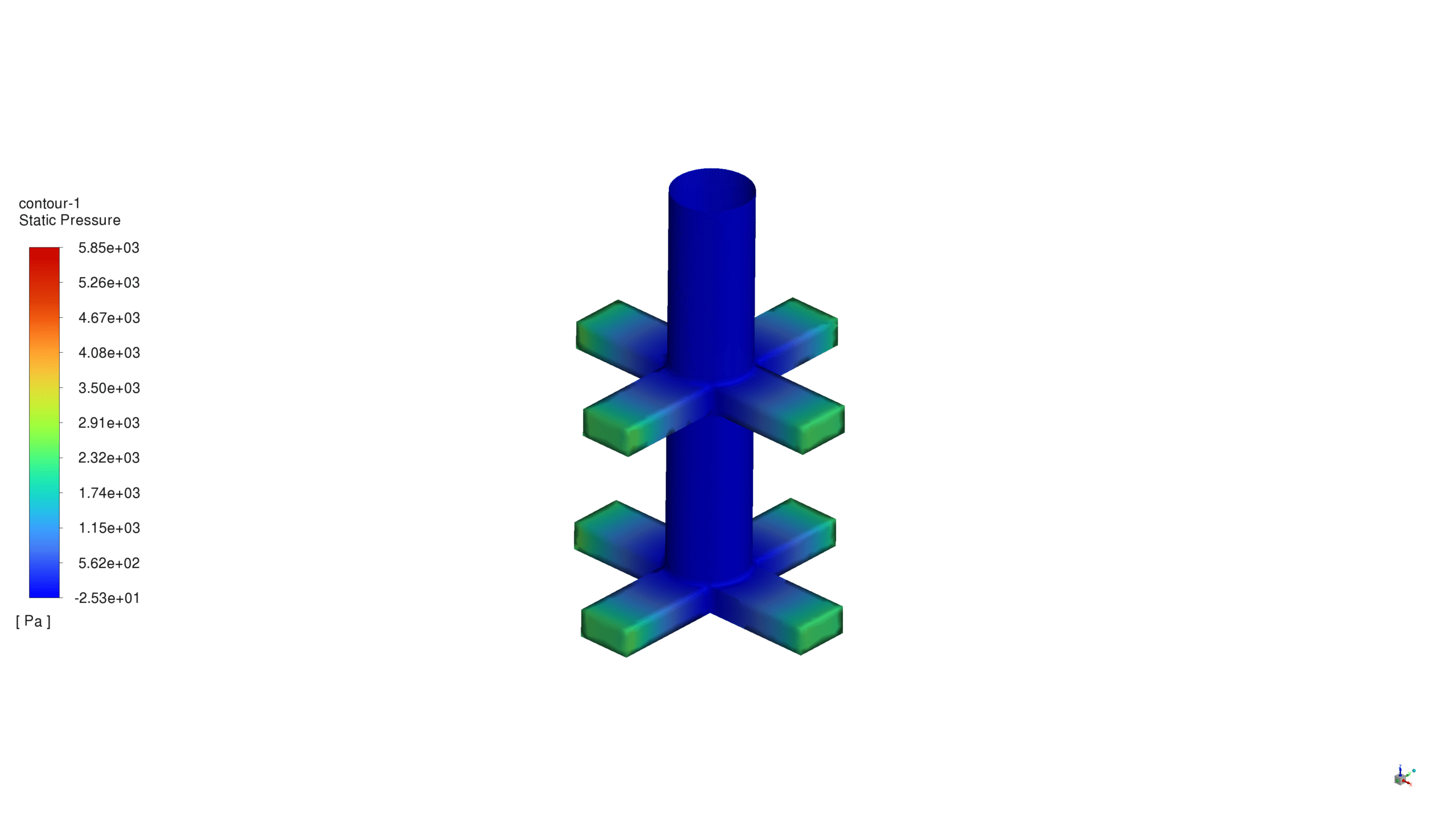
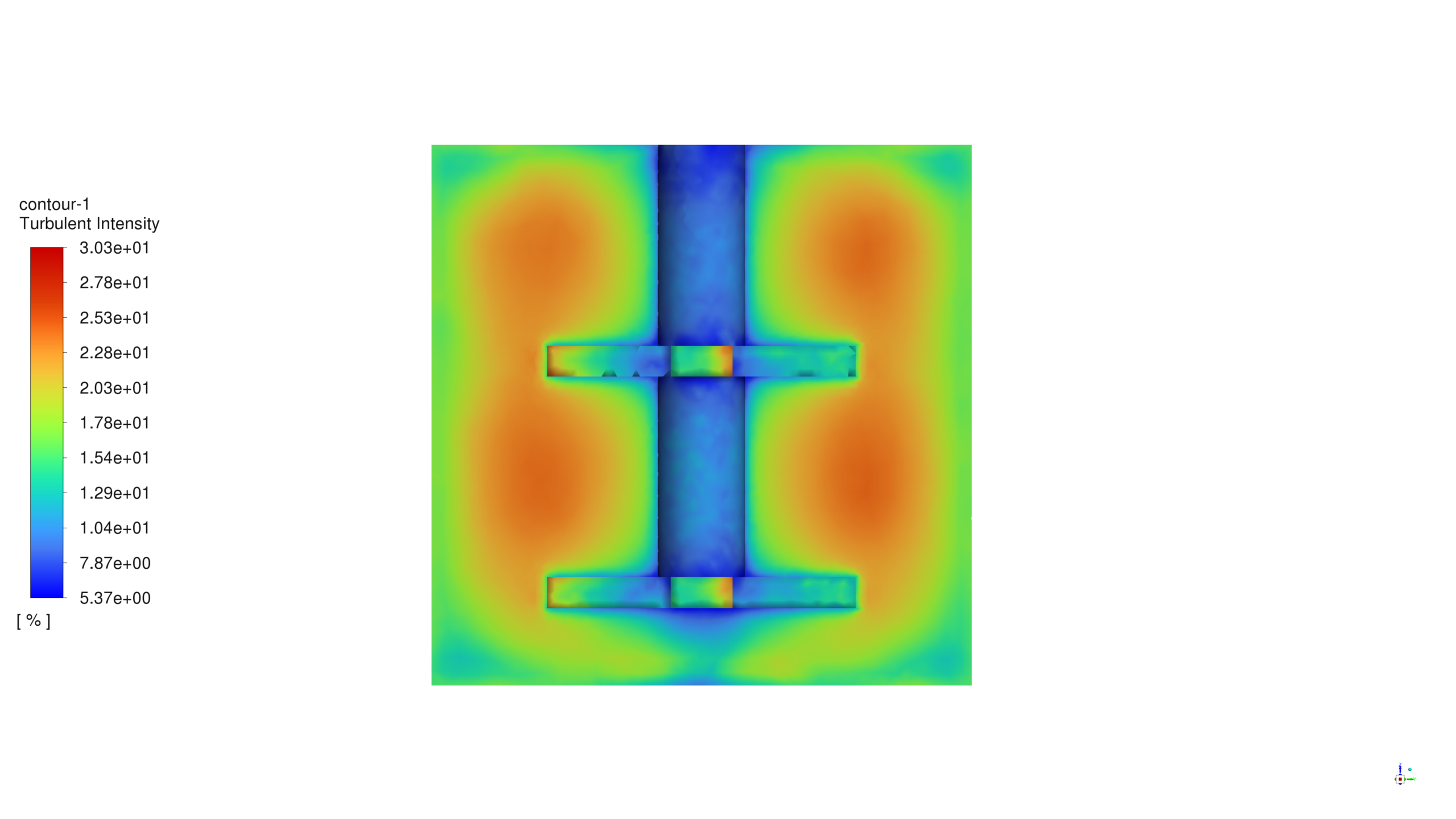
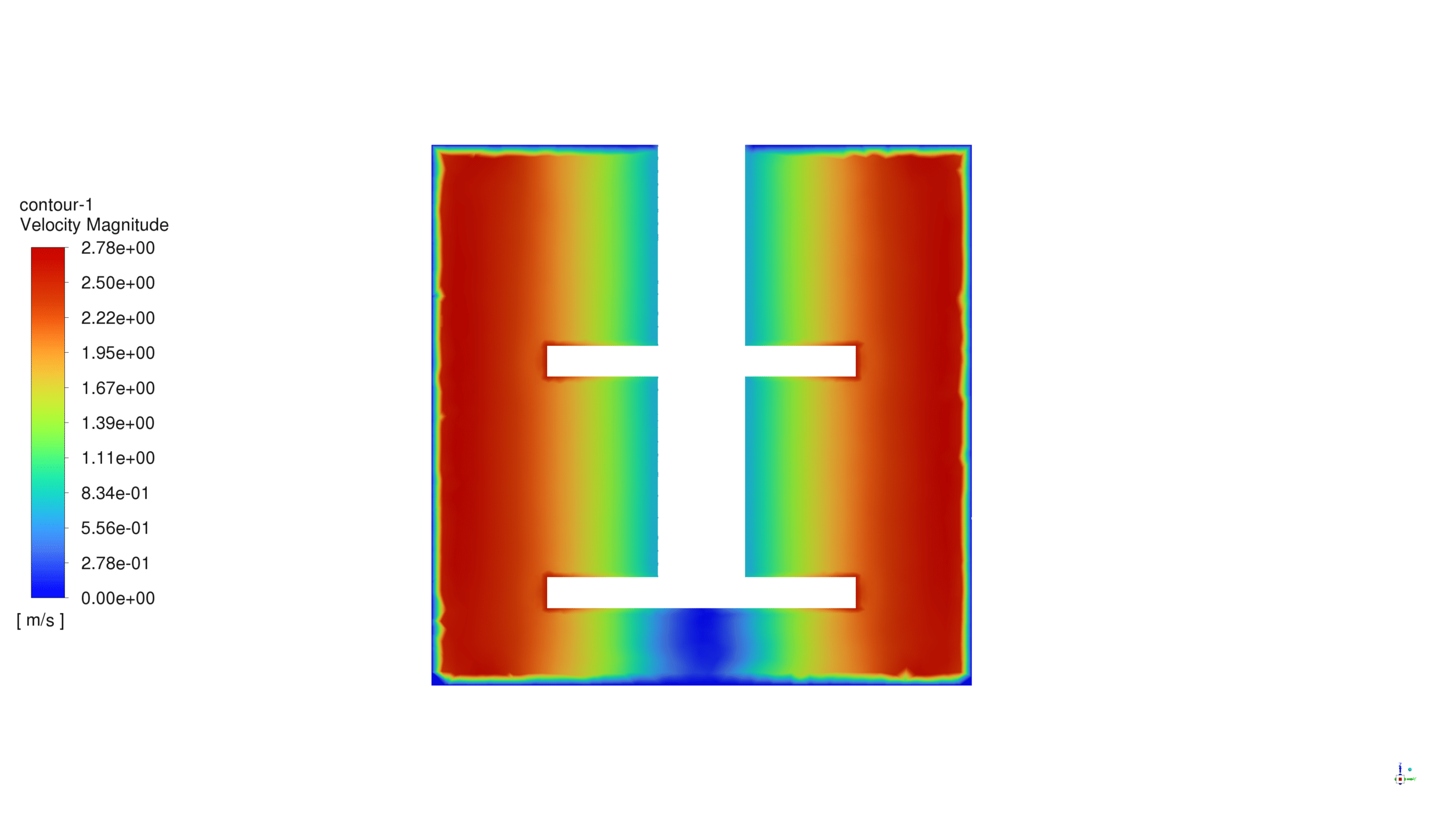
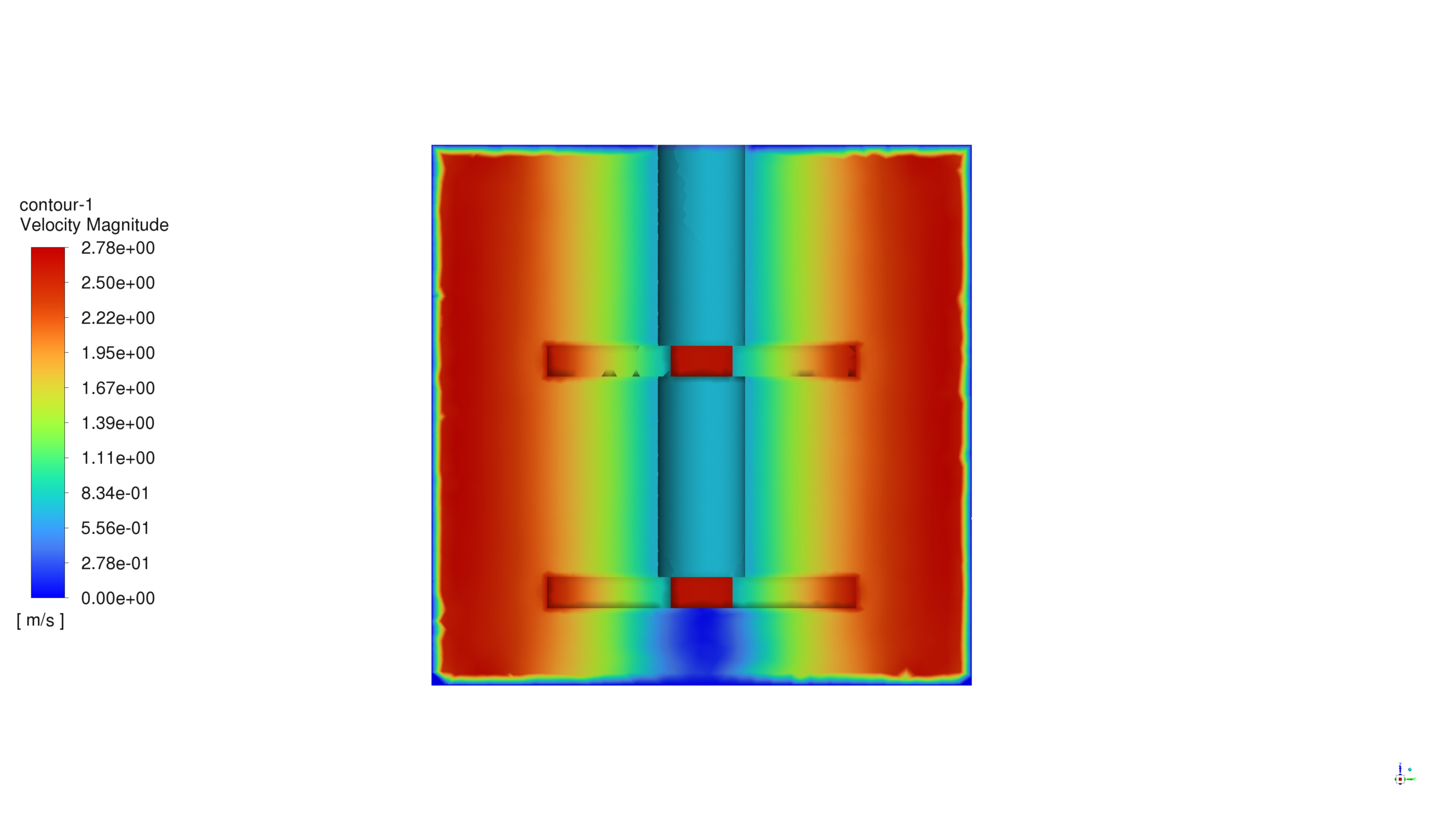
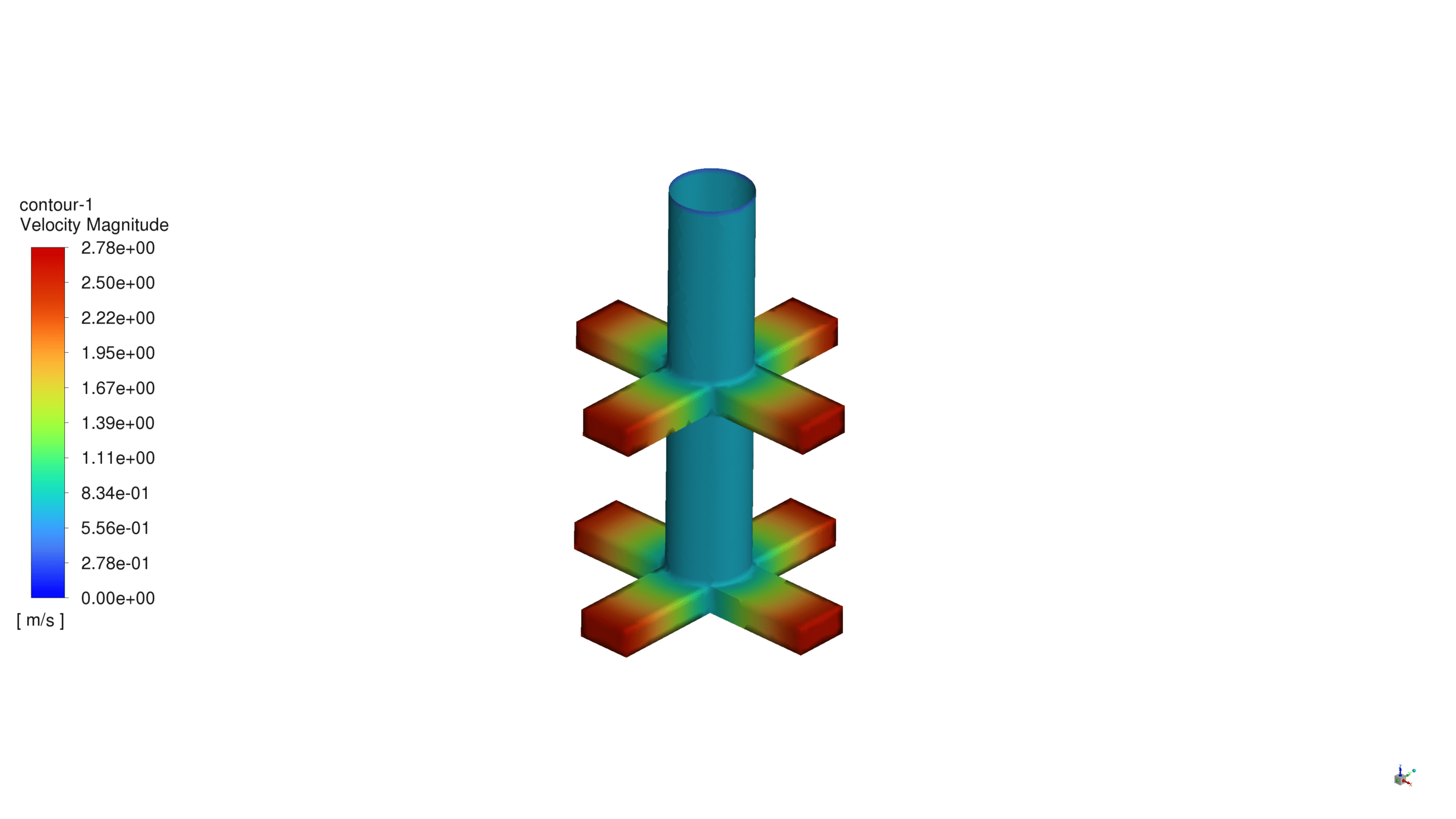
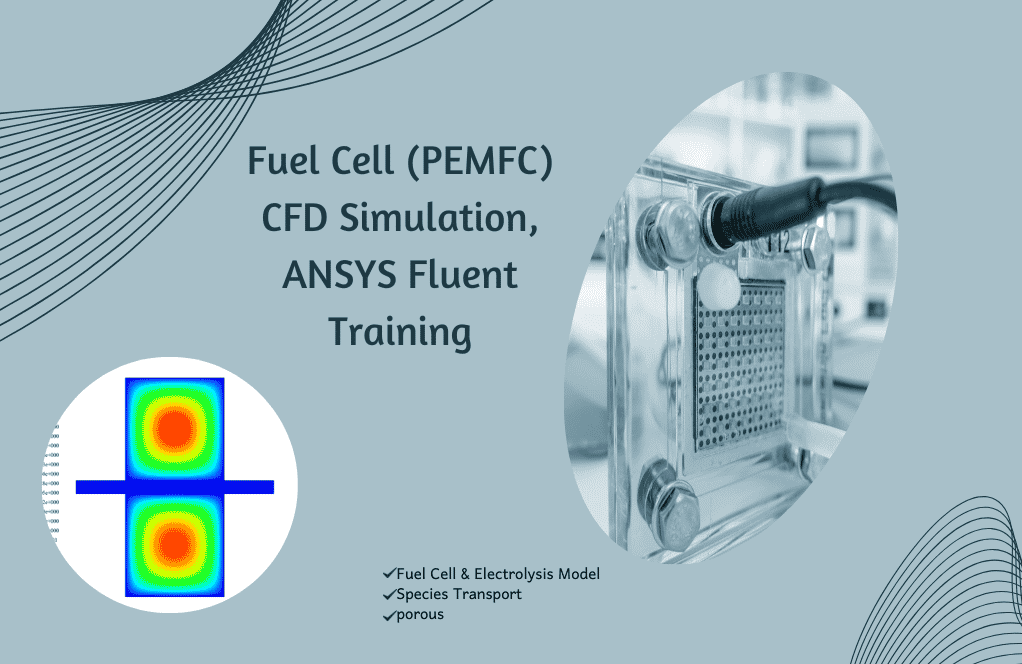
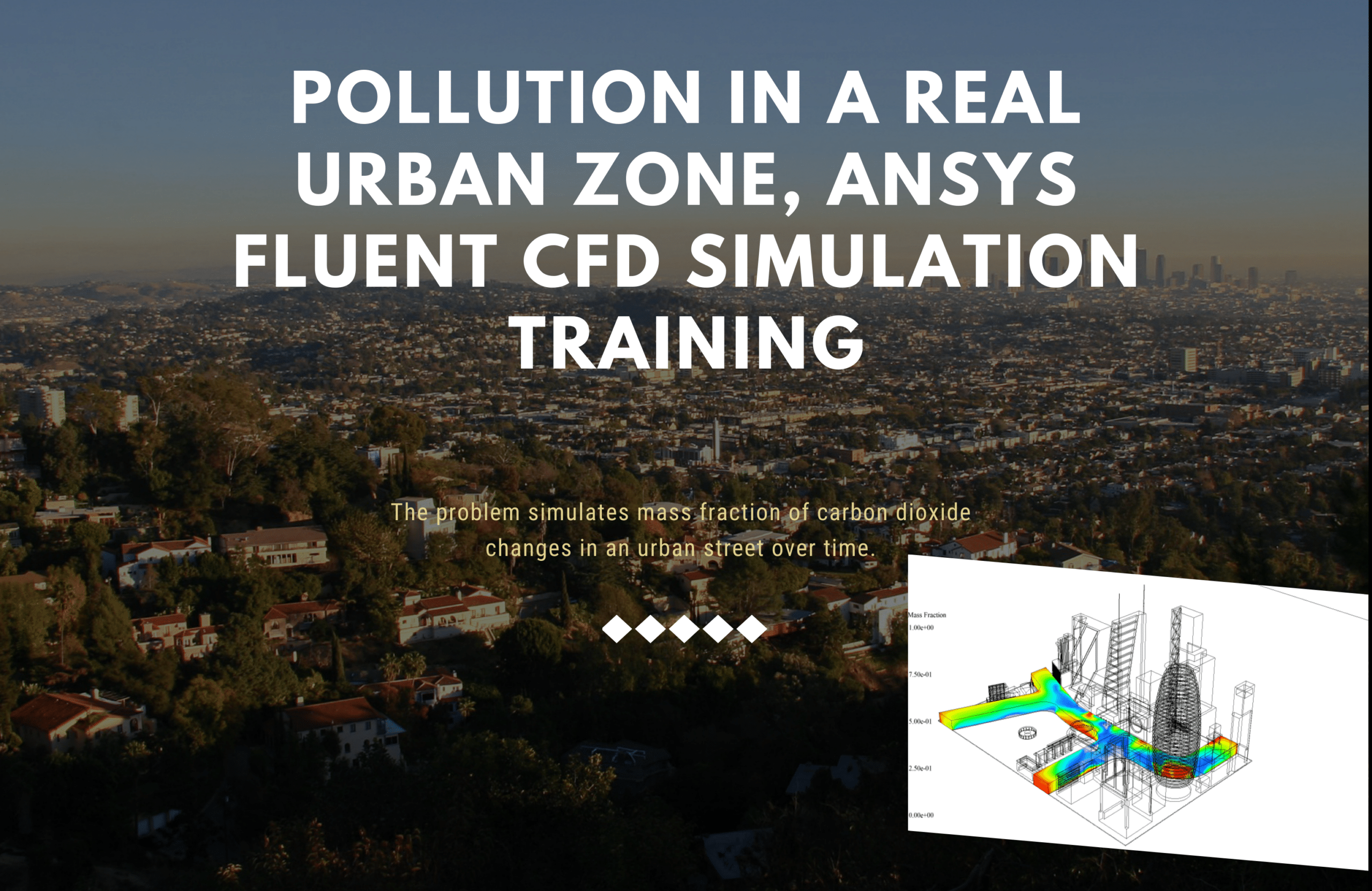

Keyon Batz –
I am thrilled with the clarity of the modeling process demonstrated in the tutorial for the mixing tank! The step-by-step instructions were particularly helpful in understanding the SRF method.
MR CFD Support –
Thank you for your positive feedback! We’re pleased to hear that our step-by-step instructions and explanation of the Single Reference Frames (SRF) method in the Turbomachinery Training Course were clear and helpful. Your satisfaction is our priority, and we look forward to providing you with more comprehensive learning materials in the future.
Mrs. Kacie Abernathy –
I thoroughly enjoyed using the SRF Method Mixing Tank simulation from MR CFD. It’s remarkable how the simulation captures the behavior of the water and the impeller’s influence, showing the increase in water pressure toward the tank walls and the increased flow speed away from the tank’s center. The visualization of turbulence intensity is insightful as well. It has definitely enhanced my understanding of fluid dynamics within a mixing tank
MR CFD Support –
Thank you for your positive review! We’re thrilled to hear that our SRF Method Mixing Tank simulation met your expectations and helped deepen your understanding of fluid behavior in mixing applications. Your feedback is immensely appreciated, and we look forward to continue providing high-quality CFD learning products.
Helmer Wunsch –
I was impressed by the use of the SRF method in simulating the mixing tank. The results look consistent and the flow pattern is well-visualized in the contours. Great work!
MR CFD Support –
Thank you for your positive feedback! We’re delighted to hear that the simulation results met your expectations and that the flow visualization was clear and informative. If you need further assistance or have more questions about our products, feel free to reach out.
Mervin Collier –
I was truly amazed by the clear visuals and detailed explanation in the SRF Method, Mixing Tank CFD Simulation tutorial. The methodology made the concepts very tangible and allowed me to grasp how rotational movements can be effectively simulated in a fluid environment. The interplay between impeller speed, resultant vortex, and its effects on pressure and turbulence intensity was fascinating. It was a comprehensive learning experience wrapped up neatly in a tutorial.
MR CFD Support –
We are thrilled to hear that you found the SRF Method, Mixing Tank CFD Simulation tutorial enriching and valuable. It’s fantastic to know the visual aids and in-depth explanations helped clarify the concepts for you. Thank you so much for taking the time to share your positive feedback, and we look forward to providing more quality educational content for you in the future.
Gina Harber –
The product really helped me understand the SRF method. I can now set up my own simulations with confidence. The level of detail in both the methodology and the results provided clarity on how the mixing tank operates. Great work on presenting the data visually as well!
MR CFD Support –
We’re thrilled to hear that our tutorial on the mixing tank using the SRF method was helpful for you! It’s wonderful to know that the explanations and data visualizations provided the clarity you needed. Your ability to now set up your own simulations is exactly the outcome we strive for with our educational materials. Thank you for choosing our ANSYS Fluent tutorial, and we appreciate your positive feedback!
Bella Macejkovic –
I’ve been looking for a comprehensive guide on mixing tank simulations, and I’m thrilled with the SRF Method tutorial by ANSYS Fluent. The clear explanation of setting up the rotational movement of the impeller and the single reference frame was superb. It brought me a much better understanding of how to handle similar cases in a steady state. The visualizations with contours really helped to conceptualize the flow behavior inside a mixing tank. Great job!
MR CFD Support –
Thank you for your positive feedback! We’re delighted to hear that you found our mixing tank simulation tutorial using the SRF method in ANSYS Fluent helpful and informative. It’s great to know our visual aids and explanations enhanced your learning experience. We are committed to providing high-quality and comprehensive learning materials for our users. If you have any further questions or need more tutorials, just let us know!
Madonna Kuhlman –
I’ve gone through the SRF Method mixing tank tutorial and the practical applications were clearly demonstrated. The step-by-step guidance made it easy to follow. Great job on presenting such a complex topic in an understandable format!
MR CFD Support –
Thank you for your kind words! We’re thrilled to hear that you found the SRF Method mixing tank tutorial to be clear and helpful. It’s great that the step-by-step instructions assisted you in understanding the complexities of the simulation. We strive to provide clear and detailed tutorials, so we’re glad it was beneficial for you.
Sylvan D’Amore –
I want to express my satisfaction with the Mixing Tank CFD Simulation tutorial. The step-by-step guidance and comprehensive explanation made it easy to understand the application of the SRF method. The detailed results and visualization were outstanding. I felt well equipped to tackle similar simulations in my studies.
MR CFD Support –
Thank you for your positive feedback! We’re thrilled to hear that our Mixing Tank CFD Simulation tutorial met your expectations and provided you with valuable insights into using the SRF method. We strive to deliver high-quality training, and customer satisfaction is our top priority. If you have any more questions or need further assistance, please don’t hesitate to ask.
Okey Shanahan DDS –
The tutorial video for the SRF Method Mixing Tank CFD Simulation was really insightful. It made understanding the methodology and analysis approach very clear.
MR CFD Support –
Thank you for your kind words. We’re thrilled to hear that our tutorial video was helpful and provided clear information on the simulation methodology. Your feedback is greatly appreciated!
Everardo McLaughlin I –
This tutorial really helped. I can see how the SRF method simplifies the problem instead of individually modeling the dynamic mesh for the impeller. Can this tutorial help me understand the modeling of both laminar and turbulent flow in mixing tanks?
MR CFD Support –
Absolutely, you’re correct. The SRF method makes it easier to handle rotations in the simulation. While this specific tutorial uses k-epsilon turbulence model intended primarily for turbulent flow, the principles learned can contribute to your understanding of laminar flow behavior in similar setups. For modeling laminar flow, you can disable the turbulence model and keep the flow regime within laminar ranges, assuming a low Reynolds number.
Prof. Kenya Goyette –
I really enjoyed learning from the SRF Method, Mixing Tank Simulation tutorial. The explanations were clear and the step-by-step approach made it very easy to follow the process for setting up and solving the simulation.
MR CFD Support –
Thank you for your positive feedback! We’re delighted to hear that you found the tutorial clear and easy to follow. It’s great to know that our step-by-step approach helped you understand the simulation of a mixing tank using the SRF Method. We appreciate your review and hope you find our other courses just as beneficial!
Godfrey Lind –
I’ve just completed the ‘SRF Method, Mixing Tank CFD Simulation by ANSYS Fluent Tutorial,’ and I must say, the results were impressive! The contours related to pressure and velocity reflected the realistic response of the water within the tank. It was intriguing to see how the pressure increased near the tank walls and how the flow speed varied accordingly. The visualization of turbulent intensity furnished me with a clear understanding of the distribution of turbulence throughout the tank. The methodology explained in the tutorial was precise and the set-up using the SRF method was well-taught.
MR CFD Support –
Thank you for your positive feedback on our Mixing Tank CFD Simulation Tutorial! We’re delighted to hear that the tutorial was able to convey the concepts clearly and effectively, and that you were pleased with the quality of the results and visualizations. It’s always our goal to deliver comprehensive learning experiences that help our clients understand and implement complex methodologies like the SRF method. We look forward to providing you with more valuable learning products in the future!
Julius Simonis –
I am thoroughly impressed by the detail in the simulation methodology for the mixing tank using the SRF method. Combined with the turblence modeling, the illustrations of water flows and pressure distributions seem very enlightening.
MR CFD Support –
Thank you for your kind words! We’re thrilled to hear that you found the mixing tank CFD simulation using the SRF method and the turbomachinery training insightful. Your feedback is greatly appreciated and encourages us to continue delivering high-quality educational content.
Jamison Bogisich PhD –
The tutorial for the SRF method in the mixing tank simulation was really easy to follow. I now understand how the simulation handles the rotational movement of the impeller and how to interpret the resulting flow pattern.
MR CFD Support –
Thank you for your kind words! We’re delighted to hear that our tutorial on the mixing tank simulation using the SRF method was clear and instructive. If you have any more questions or need further assistance in future simulations, feel free to reach out. Happy simulating!
Erich Watsica –
I was particularly impressed with the visuals provided for the mixing tank dynamics. The detailed contours of pressure and velocity not only helped me understand the flow pattern but also visually gauge the turbulent intensity changes throughout the tank. Well-presented and informative!
MR CFD Support –
We truly appreciate your positive feedback and are elated to know the contours in the tutorial provided clear and useful insights into the dynamics of the mixing tank. Thank you for taking the time to compliment our product.
Dr. Eugene Hand V –
I’m happy to see in the illustrations how the velocity and pressure change throughout the tank. The results are very clear and show the mixer’s functionality effectively, which helps in understanding turbulence impact on mixing performance. Great tutorial!
MR CFD Support –
We’re thrilled to hear that our tutorial on the Mixing Tank CFD Simulation using the SRF method was helpful to your understanding of the dynamics involved in such systems. Thank you for your positive feedback, and we’re always here to assist with any further queries you may have!
Rafaela Jast –
The tutorial for simulating a mixing tank with SRF method was amazingly detailed! The step-by-step approach was very helpful. I’m really impressed by how the setup perfectly explains the concept of the rotational movement of the impeller with the SRF technique.
MR CFD Support –
We’re delighted to hear that you found our tutorial for simulating a mixing tank by the SRF method in ANSYS Fluent both detailed and helpful! Your understanding of the impeller’s rotational movement showcases the effectiveness of our tutorial. Thank you for your positive feedback, and we look forward to providing you with more quality learning experiences.
Zoe Littel IV –
This tutorial on mixing tank CFD Simulation was a game-changer for my understanding of the SRF method and fluid dynamics. Watching the turbulent flows and rotations within the simulation gave me new insights into our real-world processes.
MR CFD Support –
Thank you for your feedback! We’re delighted to hear that our Mixing Tank CFD Simulation tutorial has enhanced your understanding and provided valuable insights. If you have any more questions or need further assistance, feel free to reach out.
Vena Huel –
I enjoyed learning about the SRF method through the Mixing Tank CFD Simulation tutorial. The step-by-step approach was very helpful in understanding how the rotational movement was modeled, and the results showing water movement and turbulence were fascinating. Thank you for such an informative tutorial!
MR CFD Support –
Thank you for your positive feedback! We’re pleased to hear that our tutorial on the SRF method was helpful and informative. It’s great that you found the visualization of the water movement and turbulence within the mixing tank fascinating. We appreciate your kind words and are glad you enjoyed the learning experience.
Ulises West I –
I am thrilled with the detailed analysis provided for the mixing tank simulation using the SRF method. The clear insights into the pressure changes and flow velocity enhancements are appreciated.
MR CFD Support –
Thank you for your kind words. We are delighted to hear that you found the analysis detailed and insightful. It’s great to know that our customers are satisfied with the quality of our simulations and training material.
Elody Turcotte Jr. –
I’m totally blown away by the clear visualizations and detailed analysis in this SRF method mixing tank simulation tutorial! The contours really helped me to understand the pressure and flow dynamics within the tank. Great work!
MR CFD Support –
Thank you so much for your kind words! We’re thrilled to hear that our visualizations and analysis proved to be helpful for your understanding of the mixing tank dynamics. If you ever need any more assistance or have further questions about our simulation tutorials, feel free to reach out. Your satisfaction is our top priority!
Easter Runte –
I just completed the ‘SRF Method, Mixing Tank CFD Simulation by ANSYS Fluent Tutorial,’ and I was impressed with how the SRF method was explained. The animations helped picture the rotational flow and the effects of impeller speed clearly. Great job on providing such an in-depth tutorial!
MR CFD Support –
Thank you for your kind words! We’re thrilled to hear that the tutorial was clear and beneficial for you in understanding the SRF method and its simulation in ANSYS Fluent. Your feedback is greatly appreciated by our team!
Elouise Crona –
I just completed the ‘Mixing Tank CFD Simulation by SRF Method’ tutorial from MR CFD Company and it was fantastic! The tutorial was very detailed and easy to follow, helping me understand how to apply the SRF method accurately in a turbomachinery context. The visual aids were great; I could see the pressure changes and velocity contours develop as the simulation progressed. Big thumbs up for including turbulence modeling insights with the k-ε model. This has given me the confidence to implement similar methods in my own projects.
MR CFD Support –
Thank you so much for your positive feedback! We’re delighted to hear that the ‘Mixing Tank CFD Simulation by SRF Method’ tutorial was helpful and that you found our materials to be comprehensive and easy to understand. At MR CFD Company, we strive to provide the best educational experience for our users, and we’re glad to have contributed to your learning journey. If you have more questions or need further assistance with your projects, do not hesitate to reach out. Happy simulating!
Manuel Shanahan Sr. –
The clarity provided in the tutorial about the SRF method was remarkable. It elucidated the concepts with enough depth that I now understand how rotational movements can be simulated effectively within a single domain. It was also incredibly helpful to see the relationship between pressure, velocity, and turbulent intensity within the mixing tank environment.
MR CFD Support –
Thank you for the positive feedback on our mixing tank simulation tutorial! We’re delighted to hear that our explanations of the SRF method helped deepen your understanding of simulating rotational movements. It’s great that the illustrations of how pressure, velocity, and turbulent intensity relate in the tank were beneficial for your learning. We appreciate your appreciation and look forward to providing you with more high-quality tutorials.